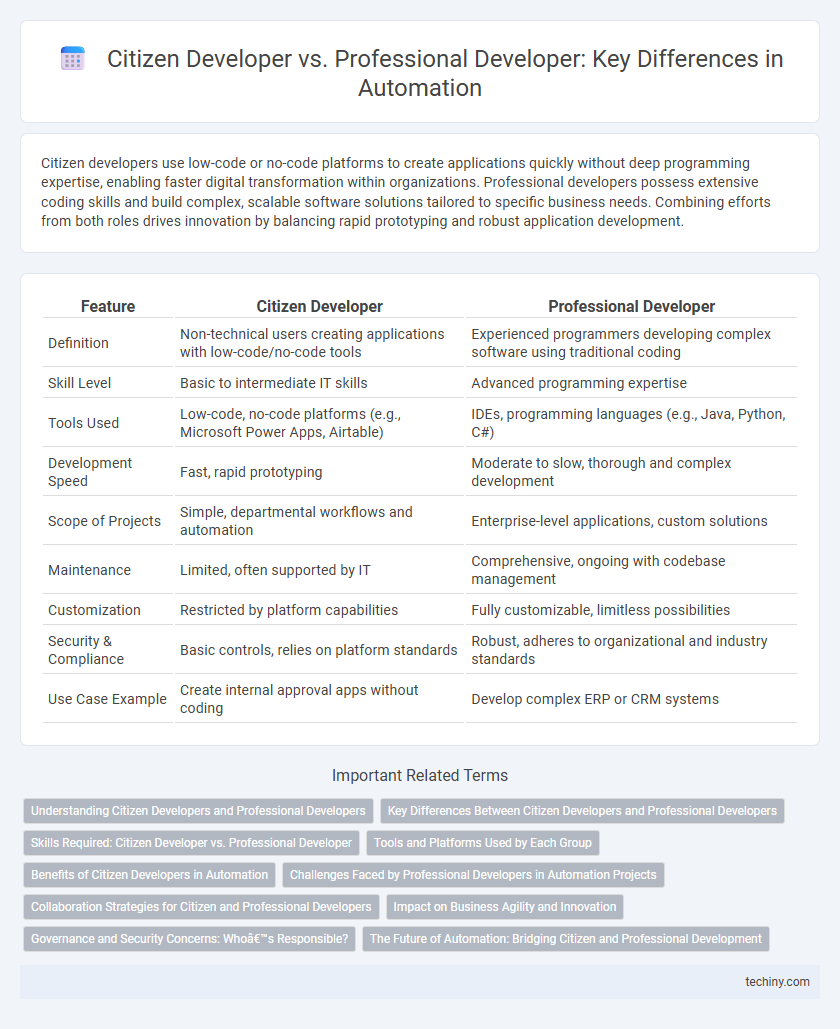Citizen developers use low-code or no-code platforms to create applications quickly without deep programming expertise, enabling faster digital transformation within organizations. Professional developers possess extensive coding skills and build complex, scalable software solutions tailored to specific business needs. Combining efforts from both roles drives innovation by balancing rapid prototyping and robust application development.
Table of Comparison
| Feature | Citizen Developer | Professional Developer |
|---|---|---|
| Definition | Non-technical users creating applications with low-code/no-code tools | Experienced programmers developing complex software using traditional coding |
| Skill Level | Basic to intermediate IT skills | Advanced programming expertise |
| Tools Used | Low-code, no-code platforms (e.g., Microsoft Power Apps, Airtable) | IDEs, programming languages (e.g., Java, Python, C#) |
| Development Speed | Fast, rapid prototyping | Moderate to slow, thorough and complex development |
| Scope of Projects | Simple, departmental workflows and automation | Enterprise-level applications, custom solutions |
| Maintenance | Limited, often supported by IT | Comprehensive, ongoing with codebase management |
| Customization | Restricted by platform capabilities | Fully customizable, limitless possibilities |
| Security & Compliance | Basic controls, relies on platform standards | Robust, adheres to organizational and industry standards |
| Use Case Example | Create internal approval apps without coding | Develop complex ERP or CRM systems |
Understanding Citizen Developers and Professional Developers
Citizen developers create applications using low-code or no-code platforms, empowering non-technical users to solve business problems quickly without extensive programming knowledge. Professional developers possess deep expertise in coding, software architecture, and complex system integration, enabling them to build scalable, robust, and custom enterprise solutions. Understanding the complementary roles of citizen and professional developers is essential to maximizing automation efficiency and innovation within organizations.
Key Differences Between Citizen Developers and Professional Developers
Citizen developers rapidly build applications using low-code or no-code platforms, prioritizing ease of use and business-focused solutions without deep programming expertise. Professional developers possess extensive coding skills and technical knowledge, enabling them to create complex, scalable, and highly customized software solutions. Key differences include development speed, customization capabilities, and depth of technical proficiency required for maintaining and evolving enterprise-level applications.
Skills Required: Citizen Developer vs. Professional Developer
Citizen developers primarily require skills in user-friendly automation platforms, basic programming logic, and business process understanding to create solutions without extensive coding expertise. Professional developers possess advanced programming skills, expertise in multiple coding languages, software development lifecycle knowledge, and the ability to build complex, scalable automation systems. The skill gap emphasizes usability and rapid deployment for citizen developers versus deep technical proficiency and robust architecture design for professional developers.
Tools and Platforms Used by Each Group
Citizen developers primarily use low-code or no-code platforms like Microsoft Power Apps, AppSheet, and Mendix that enable rapid application development with minimal coding knowledge. Professional developers rely on robust, full-featured integrated development environments (IDEs) such as Visual Studio, Eclipse, and JetBrains IDEs, alongside programming languages like Java, C#, and Python to build complex, scalable solutions. The choice of tools reflects the differing technical expertise and project complexity handled by each group in automation initiatives.
Benefits of Citizen Developers in Automation
Citizen developers accelerate automation adoption by enabling non-technical users to create workflows and apps, reducing dependence on IT departments and speeding up project delivery. Their involvement fosters greater business agility, as they bring deep domain knowledge to automate processes tailored to specific organizational needs. Empowering citizen developers lowers development costs while democratizing innovation across the enterprise.
Challenges Faced by Professional Developers in Automation Projects
Professional developers in automation projects often encounter complex integration challenges when aligning diverse legacy systems with modern automation tools. They face significant pressure to maintain security and compliance standards while delivering scalable and maintainable code. Additionally, balancing rapid deployment demands with rigorous testing protocols creates bottlenecks in project timelines.
Collaboration Strategies for Citizen and Professional Developers
Citizen developers and professional developers enhance automation efforts by leveraging collaboration strategies that align their unique skills. Citizen developers contribute domain expertise and rapid application development using low-code platforms, while professional developers provide advanced coding, system integration, and scalability. Effective collaboration includes establishing clear communication channels, defining roles for iterative feedback, and utilizing shared development environments to bridge the gap between technical and business perspectives.
Impact on Business Agility and Innovation
Citizen developers accelerate business agility by enabling rapid application development through low-code platforms, reducing reliance on IT departments and fostering immediate problem-solving. Professional developers offer deep technical expertise to create scalable, secure, and complex systems, ensuring robust innovation and integration with existing enterprise architecture. Combining both roles enhances digital transformation, balancing speed with technical excellence to drive sustainable innovation and competitive advantage.
Governance and Security Concerns: Who’s Responsible?
Citizen developers often create applications using low-code platforms, raising governance and security concerns due to limited coding expertise and adherence to organizational policies. Professional developers typically assume responsibility for implementing rigorous security protocols, ensuring compliance with industry standards and managing risk effectively. Effective automation governance requires clear roles where citizen developers focus on rapid innovation and professionals enforce security and regulatory controls.
The Future of Automation: Bridging Citizen and Professional Development
The future of automation hinges on integrating citizen developers with professional developers, creating a collaborative ecosystem that accelerates innovation and efficiency. Citizen developers leverage low-code/no-code platforms to rapidly build solutions, while professional developers provide technical expertise and ensure scalability and security. This synergy bridges skill gaps, democratizes app development, and drives enterprise-wide digital transformation.
Citizen Developer vs Professional Developer Infographic

 techiny.com
techiny.com